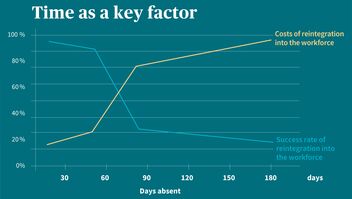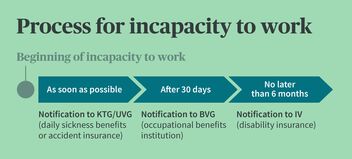Key points at a glance
- It pays to act quickly: If employees are absent due to an accident or illness, action should be taken swiftly. The less time lost, the higher the rate of reintegration.
- Help when it’s needed: Our care and case management specialists assist affected individuals and companies throughout the entire recovery and reintegration process and enable employees to successfully reintegrate into the workplace.
- Avoid long-term absences: Disablement and lengthy, expensive absences can be prevented, and your employees will soon be back at work.
What should you do if employees are absent from work?
If employees are absent due to accident or illness, you should act quickly. The less time lost, the higher the rate of reintegration.
With WeCare, the health management program for companies, AXA offers professional support throughout the rehabilitation and reintegration process. For those affected and their businesses. And not with just one, but with two options: Care Management and Case Management.

An increasing number of days absent has devastating consequences for reintegration
What are Care Management and Case Management?
Case Management and Care Management support companies in dealing with employees who are either ill or have had an accident:
- Where an absence is likely to occur: If it is likely that an employee in your company will be absent for a lengthy period, case or care managers contact the person in question early to help clarify the situation. The aim is to find a common solution that can shorten or even avoid absences.
- Where there is an existing case of incapacity for work: If an employee in your company is already unable to work, the specialists provide support with reintegration at work. They support your employees through the entire recovery and reintegration process by providing expert advice and coordinating the activities of all the parties involved by reaching across professional and institutional boundaries.
When are case and care managers used?
If any of the following unusual situations occur in your company, it's worth involving case and care managers:
- Growing evidence of lengthy periods of incapacity for work
- Absences related to terminations and conflicts
- A history of repeated short absences
- Non-justified and/or unexplained absences from the workplace
- A feeling on the part of direct line managers that something is not quite right
- Impending disability
- Need for reintegration measures
- Good prospect of a successful rehabilitation and reintegration process
Why are Case and Care Management so important?
It's hard on everyone when someone is absent from the workplace. For those affected, they have to cope with not just their recovery, but also their changing circumstances and the associated administrative tasks. In addition to looking for a replacement, there are also issues in the company in terms of employment law and insurance.
AXA's specialists offer professional support in this exceptional situation, taking the burden from all affected functions and helping speed up the return to work. It's worth it, both for employee and employer:
- Employees feel appreciated and supported by their employer. This increases job satisfaction.
- The reintegration of employees secures valuable know-how in the company and reduces the cost of staff recruitment.
- The number of long-term absences and disablements is reduced. This relieves the financial burden on the pension fund and prevents high absence costs.
AXA's reintegration offer
The sooner notification is given of an incapacity for work, the greater the chances of avoiding disablement on the part of the person concerned. This is how to proceed:
- As soon as the incapacity for work begins: Notification to daily sickness benefits insurance (KTG) or accident insurance (UVG)
With a KTG or UVG solution from AXA you can report a case of incapacity for work quickly and easily via the online claims notification service. Our experts will contact you without delay to coordinate the next steps. - 30 days after commencement of incapacity for work: Notification of the pension fund (BVG)
Do you have an occupational benefits solution managed by AXA? Simply report a case of incapacity for work (regardless of any contractual waiting period) via myAXA OPA Services (formerly wincoLink). - No later than 6 months from the start of incapacity: Notification of disability insurance (IV)
You can obtain the relevant form from disability insurance offices, compensation funds, your local branch office, or from the website of the AHV/IV Information Centre.
Case study: Reintegration at work
- Mandating: Ms. M has been absent from work for a long time after fracturing her spine. The accident was reported to AXA and the case manager contacts Ms. M and Ms. M's employer. Matters concerning employment law and insurance are clarified.
- Assessment and intervention: Ms. M needs inpatient treatment for several months. Her case manager takes over coordination with disability insurance and the doctors involved. Together with all those involved, the date for trying to start work again is set.
- Occupational integration in several steps: The case manager organizes an ergonomic adjustment to the work station and arranges for a refund through disability insurance. Ms. M returns to her job in adult education. After initially working on a 30 percent basis, she gradually increases this to 50 percent back at her workplace. After several months of trying to work, it becomes clear that Ms. M can no longer keep up with her previous performance.
- Looking for alternatives: The case manager arranges a career guidance consultation for Ms. M. This shows that she's interested in working in IT. The case manager checks further education options and coordinates with disability insurance to pay for the retraining costs.
- Outcome: Ms. M returns to her employer in her new function in IT after successfully completing her training. All scheduled measures took place as planned and the defined probationary period was successfully concluded.
Support and frequently asked questions
What’s the difference between Care Management and Case Management?
Neither Care Management nor Case Management are protected terms, so they cannot be clearly separated from one another. With both Care and Case Management, companies and employees receive professional support with reintegration at work after illness or accident.
At AXA, the decision as to whether a situation will be dealt with by Care Management or Case Management is made on an individual basis.
Who pays for Case and Care Management?
- Care Management is part of AXA daily sickness benefits insurance. There are no additional costs for AXA customers with a corresponding policy.
- If there is a chance that the rehabilitation and reintegration process will succeed, the Case Management offer is part of the obligatory accident insurance from AXA. This means that there will no additional costs.







